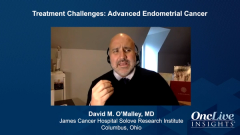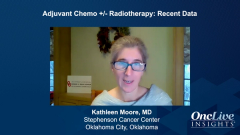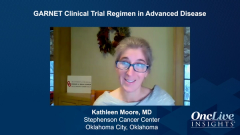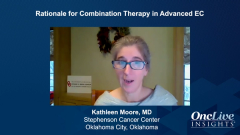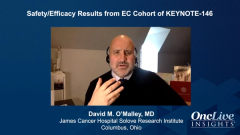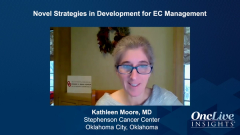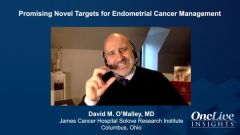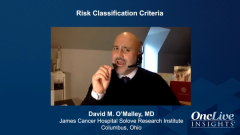
Treatment Challenges: Advanced Endometrial Cancer
Episodes in this series

David M. O’Malley, MD: The challenges of advanced disease of uterine cancer are most profound in that we still continue to hang with the history of radiation therapy. Historically, all these tumors were treated with radiation therapy. But every time we do a trial comparing radiation with chemotherapy or radiation with observation, we’re called into question the importance of radiation. With the recent PORTEC-3 trial, we now see that the combination of radiation and chemotherapy may provide benefit. But one could argue that radiation did not add much; it was the chemotherapy.
Some of the challenges we need to look at are: What’s the most important modality, and how many modalities do we need? The most important modality is chemotherapy, but radiation may play a role—especially in locoregional disease, meaning lymph node metastasis. What else is challenging? If we have locoregional disease only with curative intent, how much do we have to do it? Is radiation alone enough? Do we even need radiation? Is chemotherapy alone enough? Are there patients we could just observe after surgery? How about the patients who had a hysterectomy but did not have lymph nodes removed? Do we need to remove those lymph nodes? Every trial we’ve had on surgical staging of patients comes into question, but I digress.
When we’re looking at the advanced uterine cancer and we start thinking about patients who have metastasized beyond the locoregional, their outcomes are very poor. What do we know? The tried-and-true carboplatin-paclitaxel is still our go-to and the basis of each of our backbones of these clinical trials. That’s being questioned with the current LEAP-001 trial looking at lenvatinib and pembrolizumab vs the standard carbo-Taxol [carboplatin, paclitaxel]. We’ll talk about that in a little while.
There are many challenges in the treatment of recurrent uterine cancer. One is that if they’ve already received carboplatin-paclitaxel in adjuvant therapy, should we go back to carboplatin-paclitaxel? Or should we look at some of our new agents, like pembrolizumab in MSI [microsatellite instability] high? Or lenvatinib and pembrolizumab in MSS [microsatellite stable] patients?
We talk about platinum resistance and sensitivity in uterine cancer, but we do that with almost 0 data to influence it. We’ve extrapolated from uterine cancer, but when we really look at it, there’s no way we should be extrapolating. Is there a group of patients I would absolutely put back on carboplatin-paclitaxel? Yes, if it has been years since their prior adjuvant therapy. But as we look at the patients who have received carboplatin-paclitaxel, their response is decreased when they receive it a second time. We need more data on this population. Do I go back to it? Absolutely. Do I have data to support that? No. We need better data to support when we should go back to carboplatin-paclitaxel. I use a lot of the other agents available to us, as far as standard of care or clinical trial—rather than going back to carboplatin-paclitaxel—unless the interval is very long. Is it 2 years, 3 years? Probably 2 years.
Transcript Edited for Clarity



